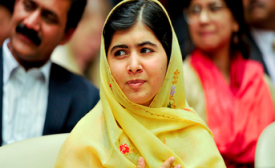taliban
The Norwegian Nobel Committee announced its selection Friday morning and it wasn't Malala. (The prize went to the Organization for the Prohibition of Chemical Weapons.) To find out how that news was received among school girls, I stopped by the Centre of Science and Technology (COSAT) — a public high school near Cape Town, South Africa, that I have been profiling this year.
Pakistani schoolgirl Malala Yousafzai has become a formidable force for rights in the year since the Taliban shot her, but an equally formidable public relations operation has helped her spread her message. The 16-year-old campaigner for girls' education has been nominated for the Nobel Peace Prize, addressed the UN, published an autobiography and been invited to tea with Queen Elizabeth II, achieving a level of fame more like that of a movie star.
If you’re of Pakistani origin, as I am, and if you long to see that embattled country right itself, the saga of Malala Yousafzai can drive you to tears. Not just tears of joy for the way she was a favorite for this year’s Nobel Peace Prize. Not just tears for how she captured the imagination of Westerners who want to believe the best about Pakistan’s hopes and prospects. More than anything, they are tears of frustration, caused by the manner in which many Pakistanis reject her.

If you’re of Pakistani origin, as I am, and if you long to see that embattled country right itself, the saga of Malala Yousafzai can drive you to tears. Not just tears of joy for the way she was a favorite for this year’s Nobel Peace Prize. Not just tears for how she captured the imagination of Westerners who want to believe the best about Pakistan’s hopes and prospects.
Another day, another calamity: thirty killed by a suicide bomber at a funeral in Quetta; the commanding General in Swat blown up by Pakistani Taliban; renewed Indo-Pakistani fighting along the Kashmir border threatens to torpedo fragile reconciliation efforts. These events—all in the past six weeks—reinforce recent disclosures in the Washington Post confirming deep-seated official US doubts and fears about Pakistan.
Ten years ago, Roeen Rahmani and some friends spent $300 on an overhead projector and a rented room to teach a business course to Afghans emerging from civil war and Taliban rule. Nobody showed up for the first class. Today, that initial effort has evolved into Kardan University, a private institution educating more than 8,000 students in programs ranging from political science to civil engineering. But for Rahmani, the school's chancellor, it's not enough.
Afghan and Pakistani leaders met for critical talks last month as President Hamid Karzai traveled to Islamabad to sit down with Prime Minister Nawaz Sharif. It was Karzai’s first visit to Pakistan since Sharif, a former two-time prime minister, took the helm of a new civilian government in June. aimed at patching Kabul’s frayed relations with Islamabad and seeking the release of senior Taliban prisoners to revive the stalled peace talks. But the lead up to the meeting did not augur well.
It's 8 a.m. on a recent day at Forward Operating Base Nolay, a small Marine outpost in Taliban-infested Sangin District of southern Afghanistan's Helmand province. The Marines are in the process of caffeinating and preparing for the day. Suddenly, explosions and gunfire ring out. The Marines don't run for their weapons or bunkers for that matter. They don't even flinch. "We can sit here and we can have a cup of coffee when there's booms going on, we're not concerned about it," says Lt. Col. Jonathan Loney.







